|
|
|
Sort Order |
|
|
|
Items / Page
|
|
|
|
|
|
|
| Srl | Item |
| 1 |
ID:
110994
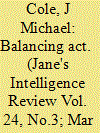

|
|
|
|
|
| Publication |
2012.
|
| Summary/Abstract |
President Ma Ying-jeou faces a difficult task balancing Beijing's expectations for political negotiations with the Taiwanese electorate's vote for the status quo.
|
|
|
|
|
|
|
|
|
|
|
|
|
|
|
|
| 2 |
ID:
116491
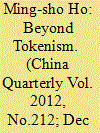

|
|
|
|
|
| Publication |
2012.
|
| Summary/Abstract |
This article challenges the accepted view that during the period of martial law Taiwan's labour unions were "a useless token." Focusing on the petroleum and sugar industries, I analyse the incremental process of how party-state control over the labour unions was converted by the workers themselves in Taiwan's national enterprises. In the early 1950s, the KMT's policy of unionizing enterprises was a complementary strategy to reinforce its slow and unsuccessful party-state penetration. With the unions' prominent role in welfare provision, workers were encouraged to develop a sense of stakeholdership. Over the years, labour unions legitimatized the interests of worker members and thus gave rise to an explosion of claim-making activities - what I call "petty bargaining." By the mid-1980s, labour unions, although still dominated by the KMT, were no longer a Leninist transmission belt, but rather functioned as a de facto complaint centre - an often overlooked precondition for the rise of post-1987 independent labour unionism.
|
|
|
|
|
|
|
|
|
|
|
|
|
|
|
|
| 3 |
ID:
173464
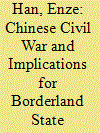

|
|
|
|
|
| Summary/Abstract |
Few studies on the legacies of the Chinese Civil War have examined its effects on state consolidation in the borderland area between China and mainland South-East Asia. This paper empirically examines the impact of the intrusion of the defeated Kuomingtang (KMT) into the borderland area between China, Burma and Thailand. In the People's Republic of China (PRC), the presence of the US-supported KMT across its Yunnan border increased the new communist government's threat perceptions. In response, Beijing used a carrot-and-stick approach towards consolidating its control by co-opting local elites while ruthlessly eliminating any opposition deemed to be in collusion with the KMT. In the case of Burma, the KMT presence posed a significant challenge to Burmese national territorial integrity and effectively led to the fragmentation of the Burmese Shan State. Finally, in Thailand, Bangkok collaborated with the Americans in support of the KMT to solidify its alliance relations. Later, Thailand used the KMT as a buffer force for its own border defence purposes against a perceived communist infiltration from the north. This paper contextualizes the spill-over effects of the Chinese Civil War in terms of the literature on how external threats can potentially facilitate state consolidation.
|
|
|
|
|
|
|
|
|
|
|
|
|
|
|
|
| 4 |
ID:
036625
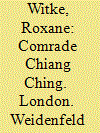

|
|
|
|
|
| Publication |
London, WeidenFeld and Nicolson, 1977.
|
| Description |
xxvi, 549p.Hbk
|
| Standard Number |
0297773461
|
|
|
|
|
|
|
|
|
|
|
|
Copies: C:1/I:0,R:0,Q:0
Circulation
| Accession# | Call# | Current Location | Status | Policy | Location |
| 017334 | 923.251/WIT 017334 | Main | On Shelf | General | |
|
|
|
|
| 5 |
ID:
100655
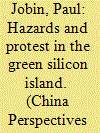

|
|
|
| 6 |
ID:
109112
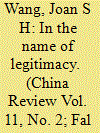

|
|
|
| 7 |
ID:
134306
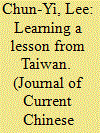

|
|
|
|
|
| Summary/Abstract |
This paper argues that the comparison of labour policies in Taiwan and China has an important bearing on the interaction between state and society. The fact that labour policies have changed over time illustrates a process of bargaining between the state and society. The core question of this paper is whether the development of labour policies in Taiwan can provide China a good example to learn from. In order to answer this question more systematically, the first part of this paper provides theoretical reviews of the state–society relationship, while the second part aims to verify whether those labour-favouring policies in Taiwan have changed under a different party’s governance. The third part of the paper further investigates labour policy in China; this section mainly focuses on the historical background to the new labour contract law. Based on the preceding two sections’ literature review of the changing path of labour policies, the fourth section scrutinises fundamental issues reflected in the development of Taiwan’s labour policies, then compares how those issues are reflected in the case of China. The conclusion of this paper is that although Taiwan, like China, formerly had a one-party system, the changes in Taiwan’s labour policies are not completely comparable to China, though both societies had some similarities.
|
|
|
|
|
|
|
|
|
|
|
|
|
|
|
|
| 8 |
ID:
134297
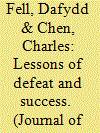

|
|
|
|
|
| Summary/Abstract |
In early 2011, the Kuomintang (KMT, Guomindang) government appeared to be in danger of losing power in the upcoming presidential elections. The DPP had recovered sufficiently from its disastrous electoral performance in 2008 to pose a real challenge to Ma Ying-jeou (Ma Yingjiu) and had matched the KMT’s vote share in mid-term local elections. Ma also faced the challenge of an independent presidential candidate, James Soong (Song Chuyu), who had come a close second in 2000 and now threatened to divide the pro KMT vote. Nevertheless, the KMT was able to win reduced majorities in both the presidential and legislative elections in January 2012. This article seeks to explain how the KMT was able to hold on to power by comparing the campaign with earlier national-level elections. We are interested in identifying the degree to which the Democratic Progressive Party (DPP, Minjindang) learnt from its electoral setbacks in 2008 and whether the KMT employed a similar campaign strategy to the one that had been so effective in returning it to power in 2008. Our analysis relies of an examination of campaign propaganda and campaign strategies as well as participant observation and survey data from 2012 and earlier contests.
|
|
|
|
|
|
|
|
|
|
|
|
|
|
|
|
| 9 |
ID:
100652
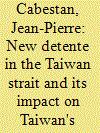

|
|
|
| 10 |
ID:
137784
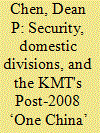

|
|
|
|
|
| Summary/Abstract |
Why does Ma Ying-jeou pursue a China-tilting policy when US–PRC relations become more competitive after 2010? Indeed, the president's mainland policy has gone far beyond the strategic requirements to satisfy international pressures for a stable cross-strait relationship. According to neoclassical realism, domestic politics acts as ‘intervening variables’ through which systemic imperatives are translated into a state's foreign policy response. Based, in part, on this author's interviews in Taiwan, this paper contends that due to Taiwan's internal political divisions on the ‘one China’ issue, elected leaders strive for their own nation-building projects, which, in turn, generate policies that undermine Taiwan's national security. Since 2008, the KMT tries to reshape Taiwan's identity through the rehabilitation of the ROC as the legitimate ‘one China’. Though Ma's rapprochement with Beijing on the basis of the ‘1992 consensus’ has contributed to cross-strait stability, his embrace of a China-centric national identity has also placed the administration increasingly at odds with Taiwan's public which gave the KMT a resounding electoral defeat in Taiwan's local elections of November 2014. As Taipei becomes more aligned to the PRC, its security ties with America and Japan could be compromised.
|
|
|
|
|
|
|
|
|
|
|
|
|
|
|
|
| 11 |
ID:
120180
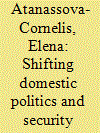

|
|
|
|
|
| Publication |
2013.
|
| Summary/Abstract |
This article examines the impact of the changed domestic political environment in Japan and Taiwan in the second half of the 2000s, namely the arrival of administrations with a more moderate China policy, on their respective relations with Beijing and Washington. It seeks to find out the extent to which Japan under the Democratic Party of Japan (DPJ) and Taiwan under the Kuomintang (KMT) may have attempted a policy shift towards accommodation of China at the expense of their respective security ties with America. The article also examines how much impact upon security policy can be traced to the changes in domestic politics in the two cases. The discussion suggests that, irrespective of the altered domestic political situation, the concern that China's growing military power may adversely affect national interests has largely trumped the political will for seeking accommodation, more so in the Japanese case than in the Taiwanese case. While both Tokyo and Taipei have avoided deferring to Beijing's interests, each has sought to strike a delicate balance between engaging China and maintaining defense ties with the US.
|
|
|
|
|
|
|
|
|
|
|
|
|
|
|
|
| 12 |
ID:
157686
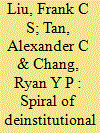

|
|
|
|
|
| Summary/Abstract |
As political scientists start applying the complex-system approach to study party politics and as business scholars start to apply communication theories to study deinstitutionalization, we prospect a new possibility to study and explain politics within a political party. This study employs a systematically collected field observation data to evaluate Clemente and Roulet’s (2015) “the spiral of deinstitutionalization” framework. Based on analysis of news events and internal reports within Kuomintang from April 20 to October 17, 2015, we believe that this framework facilitates explanation about how the decision of nominating Hung Hsiu-Chu as the party’s first female presidential candidate was replaced three months before the Election Day. We interpret the whole story and provide details that contribute to enriching the framework for future organizational and political party research.
|
|
|
|
|
|
|
|
|
|
|
|
|
|
|
|
| 13 |
ID:
151986
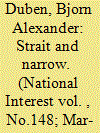

|
|
|
|
|
| Summary/Abstract |
AMONG THE four traditional geopolitical flash points in East Asia—the Korean Peninsula, the South and East China Seas, and the Taiwan Strait—cross-Strait relations between China and Taiwan have been the least likely to generate troubling headlines in recent years. This changed in early December, when President-elect Donald Trump made the controversial decision to take a congratulatory phone call from President Tsai Ing-wen—the first official interaction between a U.S. president or president-elect and Taiwan’s leader since the abrogation of formal ties between both countries in 1979. In an interview shortly afterwards, Trump appeared to question Washington’s future commitment to the “one-China” policy that had guided the U.S. approach to cross-Strait relations for nearly four decades. Trump’s actions sparked a furious reaction from Beijing and set in motion a string of provocative Chinese moves that thrust the frozen conflict over Taiwan back into the international limelight.
|
|
|
|
|
|
|
|
|
|
|
|
|
|
|
|
| 14 |
ID:
081867
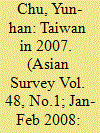

|
|
|
|
|
| Publication |
2008.
|
| Summary/Abstract |
After years of escalating tension in the Taiwan Strait, protracted partisan gridlock, and a stagnating economy, the island anxiously awaited a fresh start after the March 2008 presidential election. The election will offer the potential for a dramatic shift in the tone and trajectory of cross-strait relations, and with it the opportunity for decreased risk that the U.S. could be drawn into an armed conflict with China
|
|
|
|
|
|
|
|
|
|
|
|
|
|
|
|
| 15 |
ID:
086682
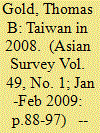

|
|
|
|
|
| Publication |
2009.
|
| Summary/Abstract |
The opposition Kuomintang (KMT) won overwhelming victories in the Legislative Yuan and presidential elections, leaving the Democratic Progressive Party (DPP) demoralized and in disarray. Former President Chen Shui-bian was indicted on corruption charges and jailed pending trial. New President Ma Yingjeou moved quickly to improve relations across the Taiwan Strait, and the long-delayed Three Links (direct air, shipping, and postal service) began in December. Taiwan's economy fared badly along with much of the rest of the world.
|
|
|
|
|
|
|
|
|
|
|
|
|
|
|
|
| 16 |
ID:
145434
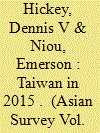

|
|
|
|
|
| Summary/Abstract |
In 2015, Taipei’s relations with Washington moved forward in parallel with the improvements in cross-Strait relations initiated in 2008. Perhaps most notable was President Ma Ying-jeou’s summit meeting with China’s President Xi Jinping. Despite gains in external relations, however, the island was plagued by partisan gridlock, a stagnating economy, and political unrest. Most anticipated a Democratic Progressive Party victory over the ruling Kuomintang in the January 2016 presidential election. But few could predict what kind of fallout the election might generate.
|
|
|
|
|
|
|
|
|
|
|
|
|
|
|
|
| 17 |
ID:
152249
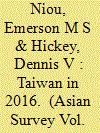

|
|
|
|
|
| Summary/Abstract |
The opposition Democratic Progressive Party won decisive victories in the Legislative Yuan and presidential elections. Despite these victories, 2016 proved to be a difficult year for Taiwan’s new ruling party. As 2016 drew to a close, polls showed that most of Taiwan’s population disapproved of Tsai Ing-wen’s performance as president.
|
|
|
|
|
|
|
|
|
|
|
|
|
|
|
|
| 18 |
ID:
164949
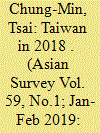

|
|
|
|
|
| Summary/Abstract |
President Tsai Ing-wen and the ruling Democratic Progressive Party suffered a crushing defeat in local elections in late November. While economic growth remains robust, with GDP per capita rising, the challenge for Tsai is to adjust policy lines and earn support for the coming presidential election.
|
|
|
|
|
|
|
|
|
|
|
|
|
|
|
|
| 19 |
ID:
179245
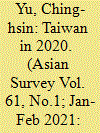

|
|
|
|
|
| Summary/Abstract |
Taiwan saw a series of crucial developments at home and abroad in 2020. Externally, the massive confrontations in Hong Kong were taken as justifying the ruling DPP’s anti-China cross-Strait policy. The impacts of the intense US–China trade war reshaped relations in the US–China–Taiwan triangle. Internally, the results of the 2020 general election strengthened the DPP’s political dominance. Likewise, the successful fight against COVID-19 buttressed the government’s popular support. Still, there are old and new socio-economic issues that will continue to challenge the governing capability of the DPP in 2021.
|
|
|
|
|
|
|
|
|
|
|
|
|
|
|
|
| 20 |
ID:
185201
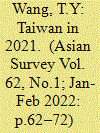

|
|
|
|
|
| Summary/Abstract |
China heightened its military pressure on Taiwan, but president Tsai In-wen defiantly resisted Beijing’s coercion and overcame domestic criticism. With a cooperative public and international support, Taipei quelled an unexpected COVID-19 outbreak. The bullish economy continues to be fueled by global demand for Taiwan’s technology products as the Taipei–Washington relationship progresses advantageously.
|
|
|
|
|
|
|
|
|
|
|
|
|
|
|
|
|
|
|
|
|